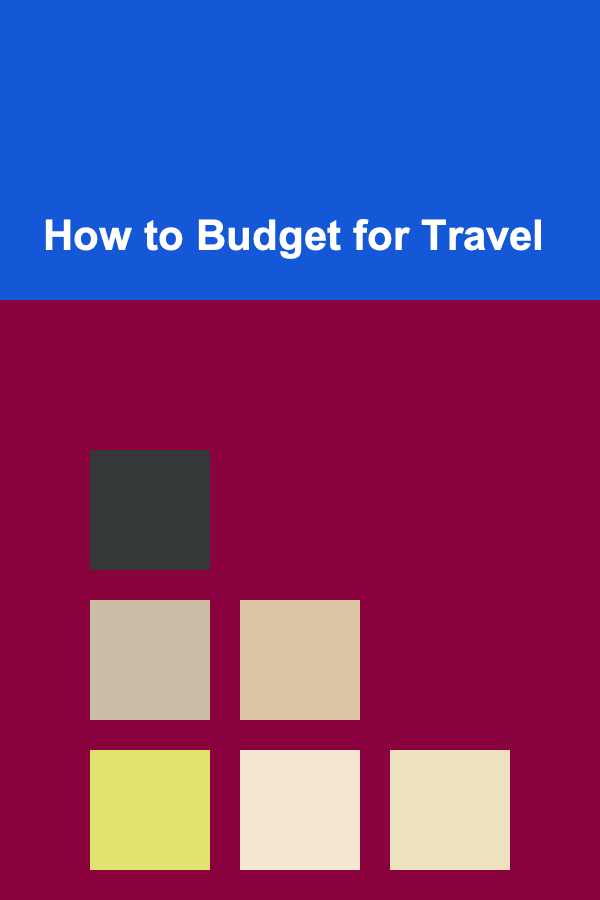
How to Budget for Travel
ebook include PDF & Audio bundle (Micro Guide)
$12.99$7.99
Limited Time Offer! Order within the next:

Traveling is one of the most enriching experiences in life, offering the opportunity to explore new cultures, meet people from different backgrounds, and create memories that last a lifetime. However, one of the biggest barriers to traveling is cost. Whether it's an international adventure or a domestic getaway, budgeting for travel is essential to ensure that you can enjoy the journey without breaking the bank.
In this article, we will discuss how to budget for travel in a practical and detailed manner. We'll explore the different types of travel expenses, how to plan and allocate your funds, tips for saving money, and how to make the most of your travel budget.
Understand the Types of Travel Expenses
Before you can start budgeting for travel, it's important to understand the various categories of expenses involved in a trip. Travel expenses can be broken down into five main areas:
1.1 Transportation Costs
Transportation is typically one of the largest expenses when traveling. This category includes flights, trains, buses, taxis, car rentals, and other forms of local transport. The cost of transportation varies greatly depending on factors such as the destination, the time of year, and how far in advance you book your travel.
- Flights: The price of a flight can fluctuate based on the destination, time of booking, and the season. Booking well in advance, using flight comparison websites, and being flexible with your travel dates can help reduce costs.
- Local Transportation: Once you arrive at your destination, you'll need to consider how to get around. Public transportation such as buses, subways, or trains are usually affordable options. Taxis, rideshares, and rental cars can be more expensive but might be necessary depending on the location.
1.2 Accommodation Costs
Accommodation is another major component of your travel budget. Depending on the type of accommodation you choose, this can be a significant portion of your trip's overall cost. Your choices might include:
- Hotels: Hotels are a common choice, with a wide range of options from budget motels to luxury resorts. Prices will depend on the location, quality, and season.
- Hostels: A cheaper option, especially for solo travelers or those on a tight budget, hostels provide dormitory-style rooms with shared facilities.
- Airbnb: Renting private apartments or rooms through Airbnb can often be more affordable, especially for groups or longer stays.
- Camping: If you're open to a more rugged experience, camping is an affordable way to stay in nature and save on accommodation costs.
1.3 Food and Dining
Food is a necessary expense when traveling, and depending on the type of destination and your preferences, this can vary. You might eat at street food stalls, local restaurants, or cook your own meals if you have access to a kitchen.
- Street Food: In many places, street food is delicious and affordable, providing an authentic taste of the local cuisine.
- Restaurants: Restaurants can range from cheap, casual dining options to upscale fine dining. It's important to research where you plan to eat to avoid spending too much on food.
- Self-Catering: If you have access to kitchen facilities, cooking your own meals can help you save money on dining costs.
1.4 Activities and Sightseeing
What you do during your trip will significantly impact your budget. Some activities are free, such as hiking or exploring a city on foot, while others can be quite expensive, like guided tours, theme parks, or special experiences like skydiving.
- Free Activities: Many cities offer free walking tours, museums, parks, and other attractions that are budget-friendly.
- Paid Attractions: Popular tourist destinations may charge entrance fees. It's a good idea to research these costs in advance and decide which ones are worth the splurge.
1.5 Miscellaneous Expenses
Miscellaneous expenses include everything that doesn't fall under the previous categories. This can include:
- Travel Insurance: Travel insurance is essential for protecting yourself from unexpected situations, such as medical emergencies, lost luggage, or trip cancellations.
- Souvenirs: While it's fun to bring back mementos from your trip, it's important to budget for souvenirs without going overboard.
- Tips and Gratuities: In many countries, tipping is expected in restaurants, hotels, and other service industries.
Plan Your Budget
Now that you have an understanding of the various travel expenses, the next step is to plan your budget. Planning ahead allows you to avoid surprises and ensures you have enough funds to cover all aspects of your trip. Here's a step-by-step approach to planning your travel budget:
2.1 Set a Total Budget
The first step in planning your travel budget is to determine how much money you can realistically spend on the trip. Consider your financial situation, other commitments, and how much you're willing to save for travel. It's essential to set a clear budget from the start to prevent overspending.
2.2 Break Down Your Budget by Category
Once you've set your total budget, break it down by category (transportation, accommodation, food, activities, etc.). Allocate a specific amount to each category based on your priorities and preferences. For example:
- If your primary goal is to explore the culture and history of a destination, you may want to allocate more of your budget to activities and sightseeing, and less on accommodation.
- If comfort is a priority, you might want to allocate a larger portion of your budget to staying in quality accommodations.
2.3 Prioritize Your Expenses
Prioritize your expenses to ensure that you allocate enough money for the most important aspects of your trip. For instance:
- Flights and accommodation should be your first priorities since they are usually fixed costs that must be paid upfront.
- Dining and activities can be more flexible, as you can adjust your spending based on your experiences and preferences.
- Miscellaneous expenses should be kept to a minimum, as they are often discretionary.
2.4 Factor in Currency Exchange Rates (for International Travel)
If you're traveling internationally, take into account the exchange rates between your home currency and the local currency. Exchange rates can fluctuate, so it's important to monitor them and consider any additional fees charged by banks or exchange services.
2.5 Build a Contingency Fund
Travel can sometimes throw unexpected expenses your way, such as emergencies, last-minute changes to your plans, or unplanned activities. To prepare for these surprises, it's wise to build a contingency fund of around 10-20% of your total budget. This will give you peace of mind and help you avoid stress during your trip.
Tips for Saving Money While Traveling
While planning is important, it's equally essential to look for ways to save money during your trip. Here are several strategies that can help you get the most out of your travel budget:
3.1 Travel During Off-Peak Seasons
Traveling during off-peak seasons is one of the best ways to save money. During peak tourist seasons, flights and accommodation prices tend to skyrocket, and popular attractions may be crowded. Traveling in the shoulder seasons (just before or after peak seasons) can help you avoid the crowds and save on costs.
3.2 Be Flexible with Your Travel Dates
Airlines and accommodations often offer better prices if you are flexible with your travel dates. Use flight comparison websites to monitor prices and set alerts for the best deals. By shifting your departure or return by a few days, you can often save a significant amount on flights.
3.3 Use Public Transportation
Public transportation is often the most affordable way to get around a city. In addition, many cities offer passes that give you unlimited access to buses, subways, and trams for a set period. This is a cost-effective alternative to taxis or rideshares.
3.4 Stay in Budget Accommodation
Opt for budget accommodation options like hostels, guesthouses, or Airbnb rentals. If you're open to meeting other travelers, hostels can offer a unique and affordable way to experience a new city. Additionally, staying with locals via platforms like Couchsurfing can help you save money and get an authentic experience.
3.5 Cook Your Own Meals
Instead of dining out for every meal, try to cook some of your meals. Many accommodations, such as Airbnb rentals, offer kitchen facilities where you can prepare your own food. Shopping at local markets and cooking your meals will not only save money but also allow you to experience local ingredients and cuisine in an authentic way.
3.6 Look for Free Activities
Many cities offer free activities such as walking tours, hiking trails, museum days, or free festivals. Research free things to do in your destination before you arrive, and take advantage of these opportunities to explore without spending money.
3.7 Book Tours and Attractions in Advance
Booking tours and attractions in advance can sometimes help you secure a discount. Additionally, you may be able to find combination tickets that allow you to visit multiple attractions at a reduced price. Many cities also offer passes that provide discounted access to top attractions.
Track Your Spending During the Trip
Tracking your spending during the trip is essential to ensure you stay within your budget. Keep a record of all your expenses, from transportation to food to souvenirs. There are many apps available that can help you track your spending and categorize your expenses, making it easy to stay on top of your budget.
Conclusion
Budgeting for travel requires careful planning and flexibility. By understanding the types of expenses involved, setting a clear budget, prioritizing your spending, and using money-saving strategies, you can make your dream trip a reality without breaking the bank. Always be prepared for unexpected expenses by building a contingency fund, and remember to track your spending to stay within your limits. With the right approach, you can enjoy your travels without financial stress, making the most of your time away while sticking to your budget.

How to Maintain an Organized Toy Area Over Time
Read More
How to Write a Comprehensive Rental Agreement
Read More
What Steps Can You Take to Keep Your Refrigerator Organized?
Read More
How to Build a Career as a Petroleum Engineer
Read More
10 Tips for Lowering Your Homeowners Insurance Premium
Read More
10 Tips for Creating a Detailed Wine Tasting Checklist
Read MoreOther Products

How to Maintain an Organized Toy Area Over Time
Read More
How to Write a Comprehensive Rental Agreement
Read More
What Steps Can You Take to Keep Your Refrigerator Organized?
Read More
How to Build a Career as a Petroleum Engineer
Read More
10 Tips for Lowering Your Homeowners Insurance Premium
Read More